We’ve been hearing about him for more than a year. This wunderkinder out of Düsseldorf, Germany, media darling and art world sensation since the age of seven. Multiple sold-out shows in his native land before his sixteenth birthday and by his seventeenth, Leon Löwentraut would take his hyper-expressionist pop paintings overseas for two solo, sold-out exhibitions: one in London, at Knotting Hill’s Muse Gallery, the other in Singapore at Bruno Gallery. And last month in Basel, at Galerie Loeffel, every Löwentraut canvas on the gallery’s walls were scooped-up by collectors within fifteen minutes from the show’s opening. Impressive, indeed.
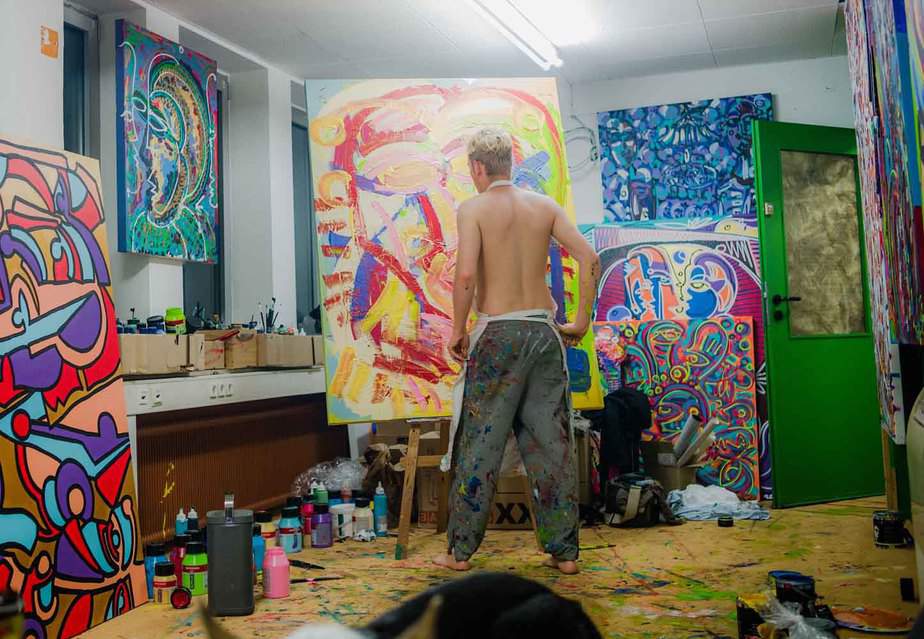
But who is he? And why does he have over 7000 adoring fans on Facebook and a free, Leon Löwentraut app downloadable in the Apple Store? What’s his shtick? As it turns out, our very own publisher/writer, Gregory de la Haba, was asked to curate this boy wonder’s first stateside exhibition at Avant Garde LES. And since de la Haba loves a good story, he enthusiastically embraced the offer to do so and in the interim find out exactly who, or what, this Leon Löwentraut is made of.
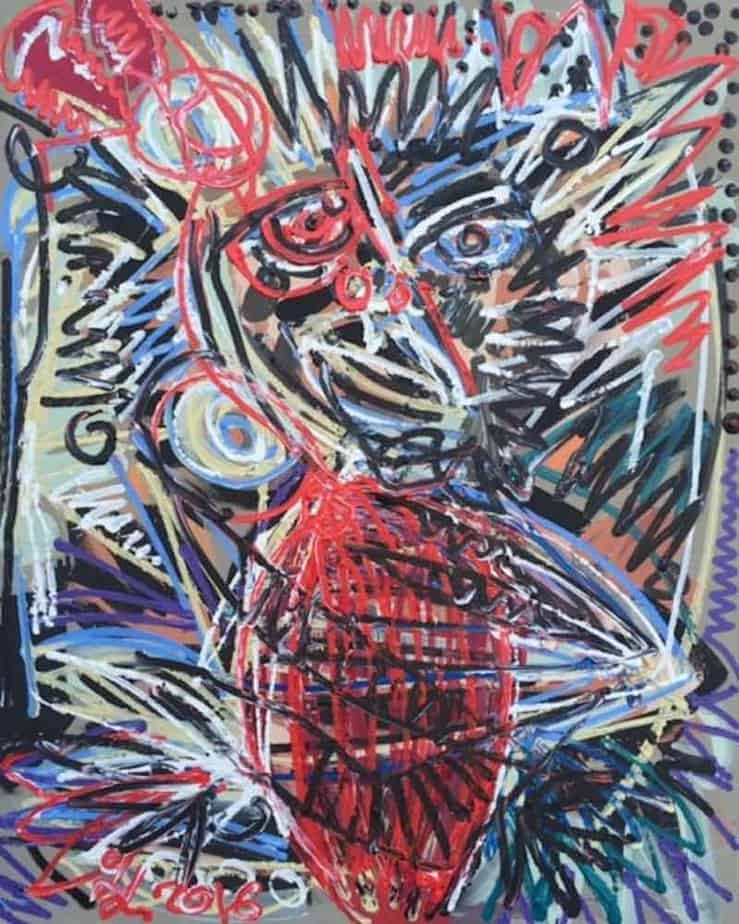
Caro In My Arms. | Leon Löwentraut.
QL: Hello, Leon. Welcome to New York. Now tell us, please, who you are and when did you start painting?
LL: Hello, I am Leon Löwentraut, a painter from Düsseldorf. I started painting at seven years old. My mother, an amateur painter, created these wonderful naturalisitic landscapes and I loved to watch her paint and she was the first to put the paintbrush in my hand. I haven’t stopped painting since.
QL: So you started painting early–as a child–but when did you realize you wanted to be an artist?
LL: When I was a child, I remember visiting a friend of my grandfather’s who was an artist and walking into his studio and seeing these large canvases with bright colors that I found so amazing and exciting and to this day I never forgot them –although I did forget this artist’s name, sadly. This was around the same time I started painting with my mother and between the experience of being in a real artist’s studio with massive, bright paintings and a mother providing me the tools necessary to begin, I knew very early that I wanted nothing else other than to paint and create works of art on canvas. I’m still learning about being an artist.
QL: What is your daily schedule like? School in the morning, painting in the evening?
LL: Yes, exactly. I wake every day at 6:30 for school, come home, do homework and then start painting right away, often till very late. Painting is very calming and I enjoy it tremendously. My goal each morning when I wake is to work on one painting each evening. And I do. But I finished school this summer and I feel very good. Now I can concentrate all my power for painting!
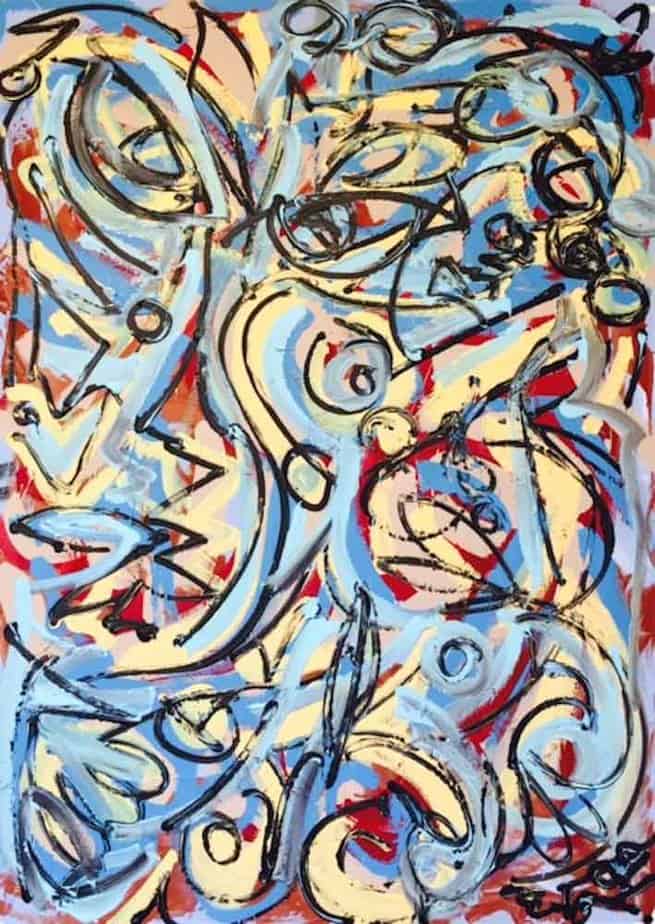
Who Is the Right One. | Leon Löwentraut.
QL: I like that, ‘all my power’. Good for you. Where is your studio, Leon?
LL: It is in the cellar of my parent’s home near Düsseldorf at Meerbusch-Büderich.
QL:You paint in the cellar of your parent’s home?
LL: Yes, why? Is that a problem?
QL: No, not at all. I love it. The rumblings in the European press painted you as a spoiled kid and I assumed you probably had a ten thousand square foot studio in Berlin or Leipzig. With assistants to boot.
LL: Ha, ha, no. I paint everything myself, thank you, and work at home.
QL: Tell me what dead artist you admire and one living artist you admire?
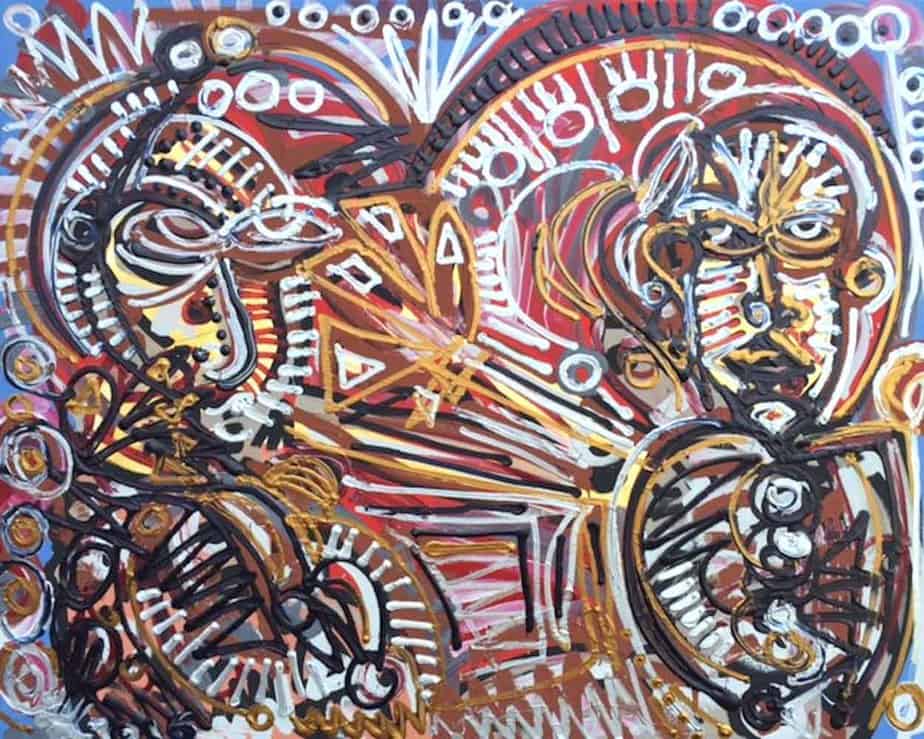
Come And Go. | Leon Löwentraut.
LL: Well, I admire four dead artists: Picasso, Basquiat, Pollock and Warhol. Each completely different with their own style and attitude and attitude matters a lot to me. I’m not a fan of the drugs Basquiat took but god do I love his attitude, his force in expression on canvas, pure genius, raw genius. With Picasso, I loved most his marketing genius as well as his line. With Pollock, I like that it took him a while to find himself, I find this very hopeful. Unfortunately, he had to drink too much to mask the fact that he didn’t have his unique style early on and that he was insecure, I believe. But when he found his own style he really killed it, yes?
QL:He sure did.
LL: And with Warhol, I love his erscheinungsbild, how do you say this in English?
QL: His appearance?
LL: Yes, his appearance, his style and connection with fashion and art, I really like that and admire when someone has the ability to really create their own persona as he did with his trademark wig and glasses plus make art that looked like no one elses before him. Amazing, no?
- Leon Löwentraut. | Dusselfdorf Studio.
- Leon Löwentraut. | Dusselfdorf Studio.
QL:Totally. And what living artist do you admire?
LL: I haven’t met Gerhard Richter yet but he would definitely be my favorite!
QL: And I saw that you did meet Julian Schnabel. Was he nice?
LL: Yes, he was great. Very nice. I met him when he had his opening in Germany and we talked and traded emails. And I showed him my work. He was very impressed about my pictures for my age and loved also the colors very much.
QL: Well that’s impressive to have Julian Schnabel look at your work and have something nice to say about it. Good for you. You carry yourself well, confidently, people see that, are drawn to that and I’m sure has contributed to your tremendous success, no?
LL: Yes, but confidence also comes from working hard and this is what I do most.
QL: Bingo! A solid work ethic is key to success. But what do you contribute your commercial success to?
LL: It’s very rare to sell paintings for certain prices and I also know that it is not normal and I thank god for my luck and I am very thankful about it. Nonetheless, I work very hard all the time and make well thought-out descisions and plans about my career. I’m constantly asking myself and those around me who know better what more I can do better in regards to marketing, selling and what art shows are best for me to participate. I believe people respond to my work and purchase it because I work from my guts, my soul. I’m not creating art to make money and I’d really like to believe people see that and feel it. They enjoy the honesty of my work.
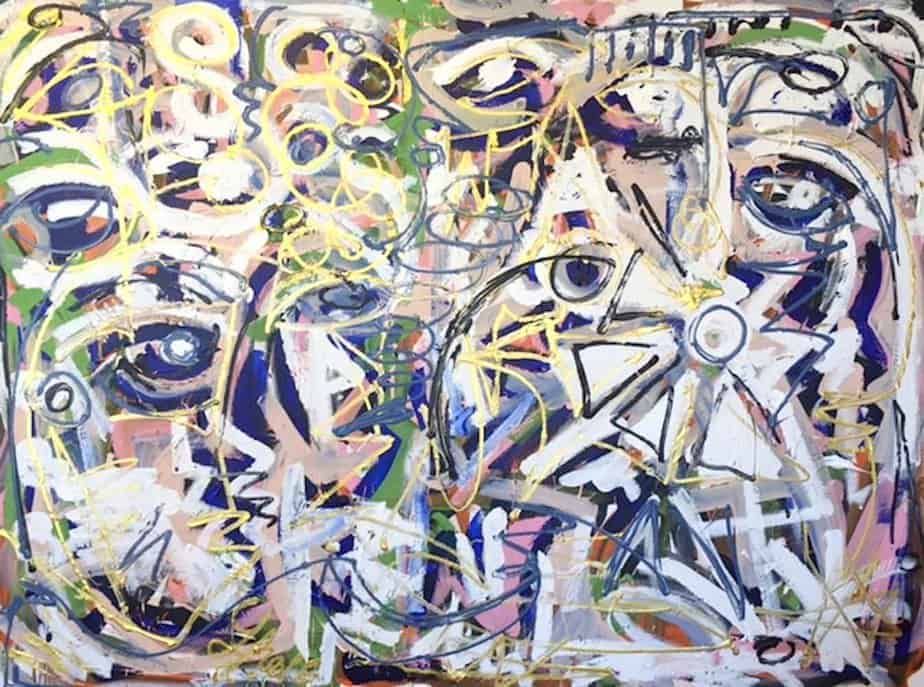
Evening With Friends. | Leon Löwentraut.
QL: With success come the haters and you seem to have a few. Tell me about the negative press you’ve gotten. Do you care? And, what are they saying about you in Germany?
LL: I don’t care about negative press, but sometimes it’s good; people want to read about bad things and they also want to see that successful people collapse. Sometimes they wrote that my parents just want to make me famous which is pure bullshit. My parents care about their son and wish for me to succeed, plain and simple. They do no more or less than what parents of a talented athlete would do for their son or daughter. How many parents around the world are driving their children miles and miles for proper training or to play in competitive games, yes? Or what about musically inclined children and the hours and hours devoted to practice every day? What parent doesn’t wish success for their child? The difference is my parents take me to participate in art shows and exhibitions instead of football games to play. They see how hard I work with my art. I paint everyday. It’s a true passion for me. My critics also say I’m just dreaming and don’t know how the real life is. They’re right. I’m not as old as them (laughs). And they can say whatever they want. I’ll take my dreams over their criticism any day (laughs). It’s all part of the journey, yes, Gregory?
QL: It most certainly is, Leon. I commend you for seeing it so lightly and not being negatively affected by it. Tell me what the act of painting means to you? Why do you paint?
LL: I paint because it is my passion. I’ll paint for two weeks straight and then it might catch up to me and I’ll get tired and need to rest but when resting I start to get anxious and need to start painting again soon. I’m always thinking about paintings. Another thing, I do not speak very well about my feelings, I tend to be quiet about them in this regard, but in my paintings I find it very easy to express my feelings and emotions. Normally, with friends and family, I am the extrovert. I love to have fun and meet people. But when I paint, I’m a complete introvert and prefer to be left alone to work.
QL: When I look at your work, I see expressive linear mark-making –something akin to the way graffiti artists ‘tag’ a wall or a NYC subway train. Tell me about your process, your approach to picture making. Tell me about the layering of paint (oil or acrylic?), tell me about the surface, the ground and how you feel about paint. What turns you on about art and being a painter?
LL: When I was a kid between the ages of 6-10, I had many books on graffiti art and I sometimes tried to copy these graffiti lines and styles. I work in acrylic on white primed fabric and usually listen to music and almost always just begin working without much premeditated thought. I just do it. Sometimes I have a subject in mind or a theme or the thought of a girl gets me going and sometimes before I paint I might make a sketch in pencil. But I love to work at night and go right at it. I can honestly say that art and being a painter excites me and that I can be myself when working and what matters more in life than being yourself?
I paint because it is my passion. I’ll paint for two weeks straight and then it might catch up to me and I’ll get tired and need to rest but when resting I start to get anxious and need to start painting again soon. I’m always thinking about paintings.Leon Löwentraut.
QL: Very true. You seem wise above your years. Talk to me about two of your paintings: ‘Come and Go’ and ‘Evening With Friends’.
LL: ‘Come and Go’ is about how I feel for this beautiful girl I really like. I want her physically–to have sex with her–but I don’t want a relationship with her because my feelings are not strong enough for her. One hand is pulling her close, trying to grab a kiss, and the other is pushing her away. The drama of an 18 year old boy. (laughter) ‘Evening with Friends’ depicts my best friends Philipp, Tristan and Lea who enjoy visiting my studio and one night I just decided to paint them. On the right side, you can see some triangles one on top of the other and the triangles interprets Phillip’s voice. He was shouting for some reason while we were all laughing and having fun and just being kids. We spend much time together and these moments mean a lot to me and I very much wanted to capture that youthful specialness, our teenage fun in paint to last forever.
QL: Are you ready for your New York show?
LL: Yes, I hope so. I’m very exited and anxious to see how the people respond to my paintings and which people I will meet there.
QL: Tell me about the title, Träumereien?
LL: I believe in English the simplest meaning is dreams. But also it can mean reverie or a fantastic, visionary idea; fanciful musings. All of these wonderful things that are mysterious and exciting at the same time. Like coming to New York to exhibit my paintings. A dream come true.
QL: Thank you, Leon. We wish you well. Keep rocking it!
LL: Thank you very much, Gregory. See you at the opening.
Leon Löwentraut: Träumereien
Avant Garde LES
319 Grand Street
Opening Reception: November 18th
November 16th – November 28th
Curated by Gregory de la Haba

Quiet Lunch is a grassroot online publication that seeks to promote various aspects of life and culture with a loving, but brute, educational tinge. When we say, “Creative Sustenance Daily,” we mean it.



